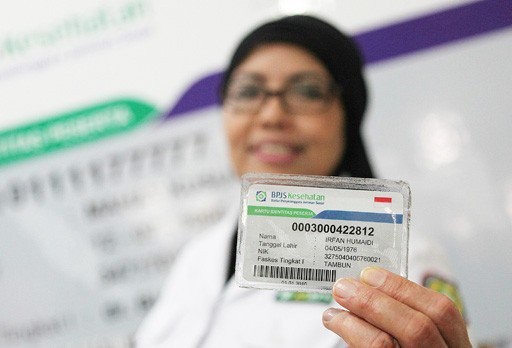Popular Reads
Top Results
Can't find what you're looking for?
View all search resultsPopular Reads
Top Results
Can't find what you're looking for?
View all search resultsCOMMENTARY: How can we save our national health insurance program from deficit?
The deficit stood at Rp 3.3 trillion in the first year, which grew to Rp 5.7 trillion in 2015 and Rp 9.7 trillion last year.
Change text size
Gift Premium Articles
to Anyone
W
ith a sharp deficit recorded in its three years of implementation, we cannot do anything but look back at what expectations we had of the national health insurance (JKN) program.
A deficit of Rp 9.7 trillion (US$727.98 million), as reported in the implementation of the JKN-Indonesia Health Card (KIS) program in 2016, reveals the financial limits we should have anticipated from the very start.
The start of the Health Care and Social Security Agency (BPJS Kesehatan), which runs the JKN, was quite ideal, with 96.4 million low-income people covered by the government when it took effect on Jan. 1, 2014. Coverage is unlimited in amount, nor is it restricted to specific illnesses. There is no other insurance policy with coverage as large as BPJS Kesehatan, which, much more importantly, is “not for profit.”
While setting the ultimate goal that by 2019 no Indonesian citizen will go without health insurance, the JKN-KIS program has continued to suffer a deficit since its launch. The deficit stood at Rp 3.3 trillion in the first year, which grew to Rp 5.7 trillion in 2015 and Rp 9.7 trillion last year.
Concerned about the sustainability of the government’s flagship program, Coordinating Human Development and Culture Minister Puan Maharani demanded during a meeting on March 30 that BPJS Kesehatan seek immediate solutions to narrow the JKN budget deficit for 2017. She gave the agency one month to present a best-case scenario to stop the bleeding.
In the meeting, poor participation of local administrations in the social health insurance program was identified as one cause for the deficit — 41 regencies and cities across Indonesia have yet to integrate their social health insurance programs with BPJS Kesehatan. Hence, strengthening the roles of local administrations is crucial in tackling the problem.
Cost-sharing with local administrations alone may not be able to prevent the deficit from widening further, given the heavy burden caused by growing health problems, particularly non-communicable diseases. That’s why other options — such as the possibility of using funds from cigarette excise revenues distributed to local administrations; or the state budget’s idle and unused funds (SILPA), which come from funds earmarked for regional governments — will be explored as a JKN financing source in efforts to close the deficit.


















